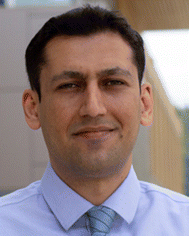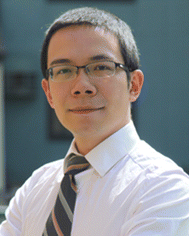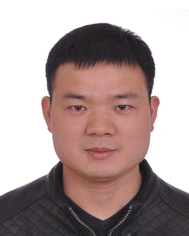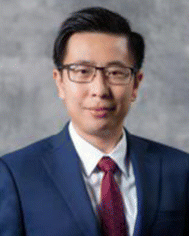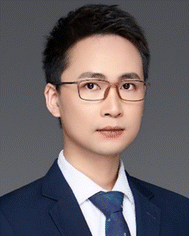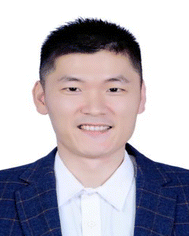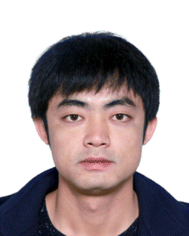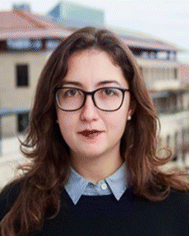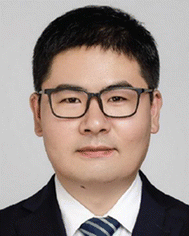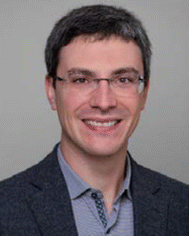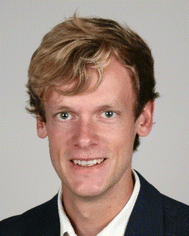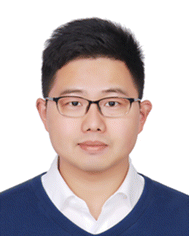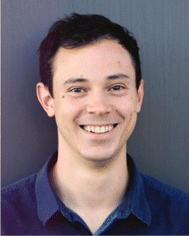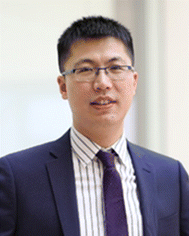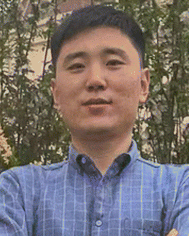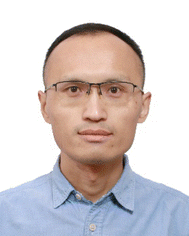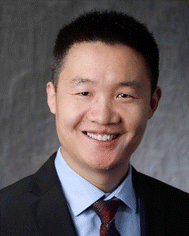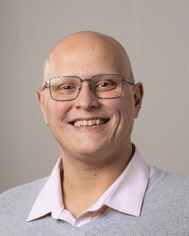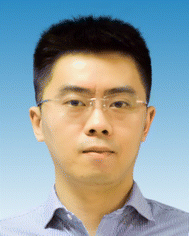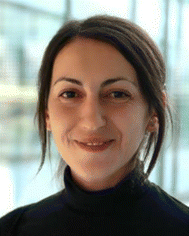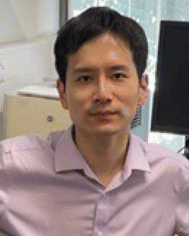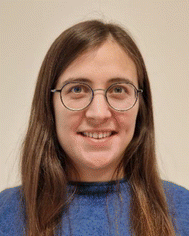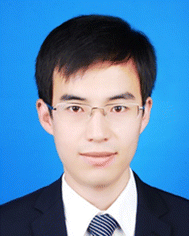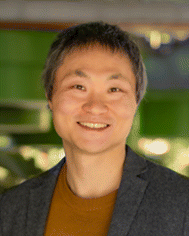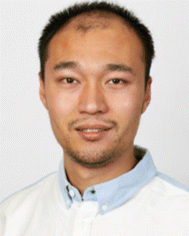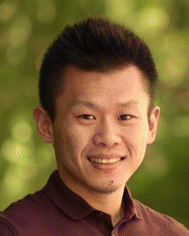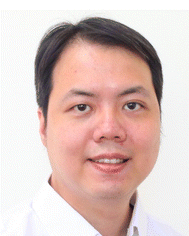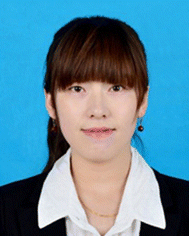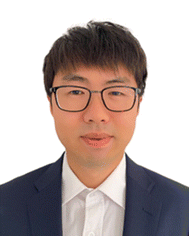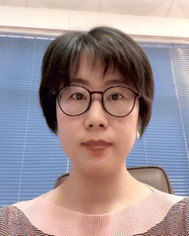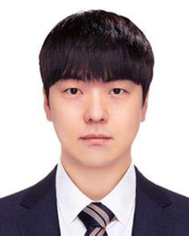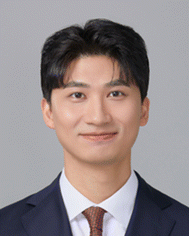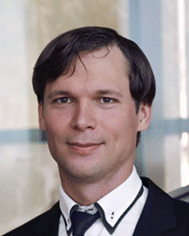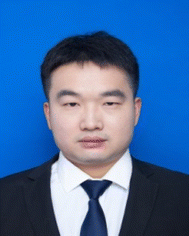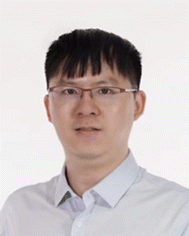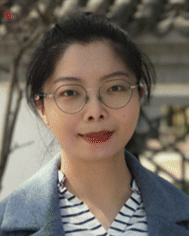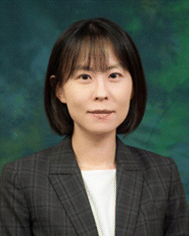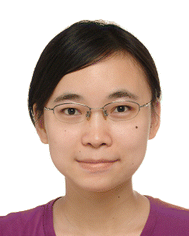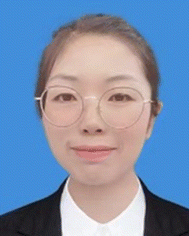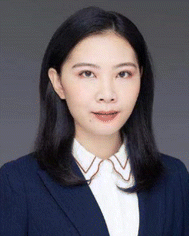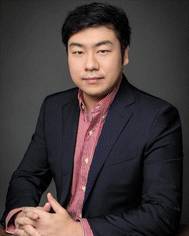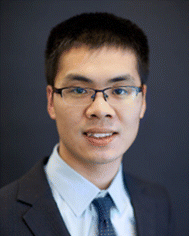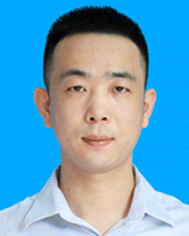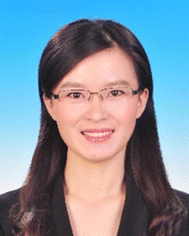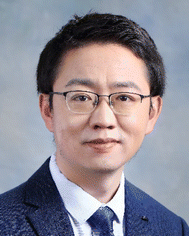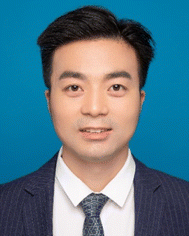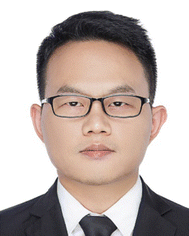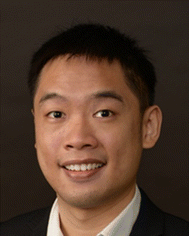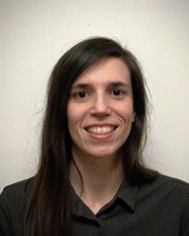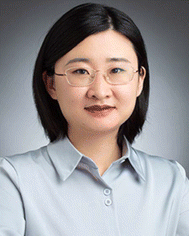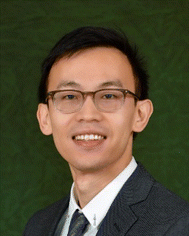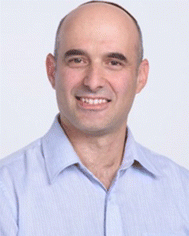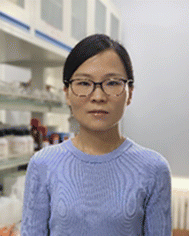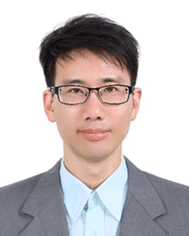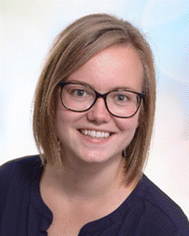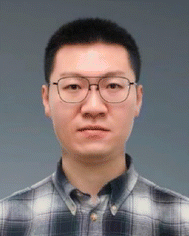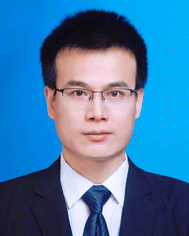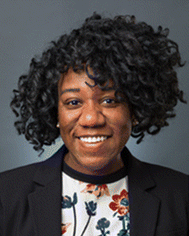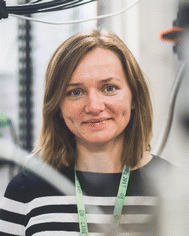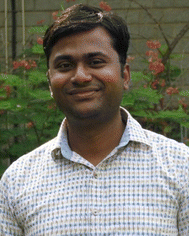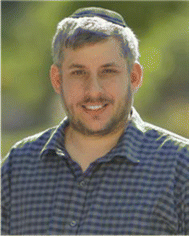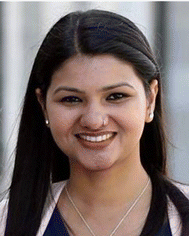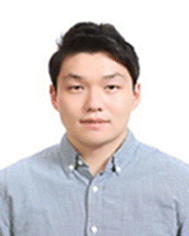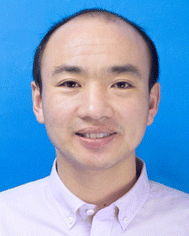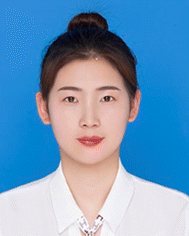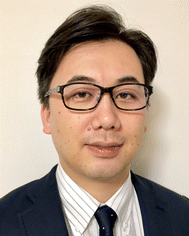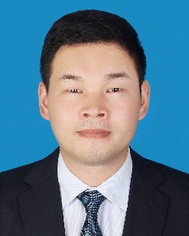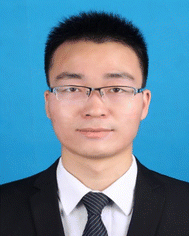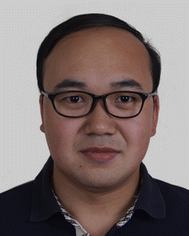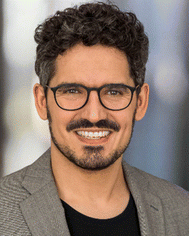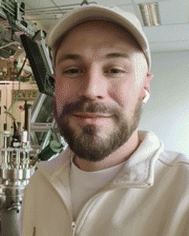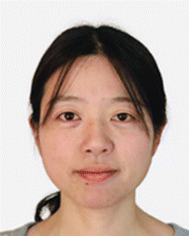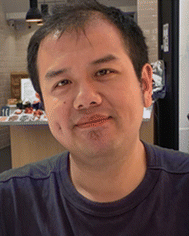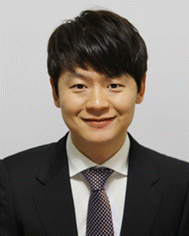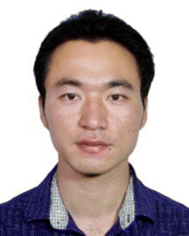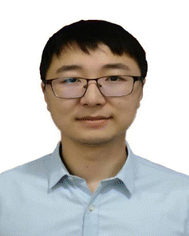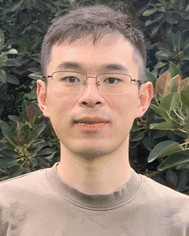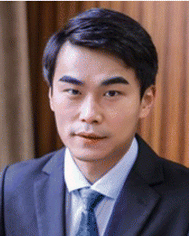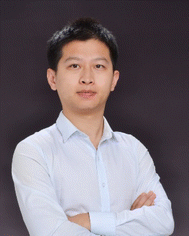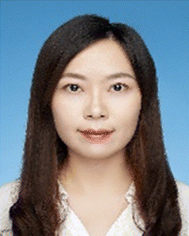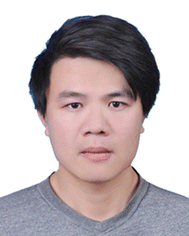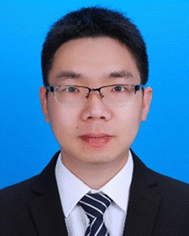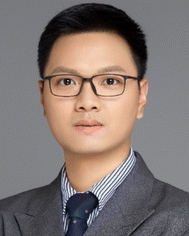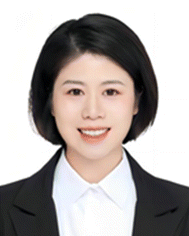DOI:
10.1039/D3TA90182C
(Profile)
J. Mater. Chem. A, 2023,
11, 20349-20367
Contributors to the Journal of Materials Chemistry A Emerging Investigators 2023 collection
Abstract
Our 2023 Emerging Investigators themed collection gathers some of the best research being conducted by scientists in the early stages of their independent career. Each contributor was recommended as carrying out work with the potential to influence future directions in materials chemistry. Congratulations to all the researchers featured, we hope you enjoy reading this collection.
Dr Mohammad Arjmand is a leading and award-winning researcher in the areas of nanotechnology and polymer science and engineering. Arjmand has been a faculty member since 2018, at the University of British Columbia, Okanagan Campus (UBCO). He is also a Canada Research Chair in Advanced Materials and Polymer Engineering and the technical lead of the Plastic Recycling Research Cluster at UBCO. Arjmand directs the Nanomaterials and Polymer Nanocomposites Laboratory (NPNL), which focuses on the synthesis and engineering of multifunctional nanomaterials and polymer nanocomposites. Prior to joining UBCO, he was a postdoctoral fellow at the Universities of Calgary and Toronto.
His contribution to the 2023 Journal of Materials Chemistry A Emerging Investigators collection can be read at DOI: https://doi.org/10.1039/D3TA01021J.
Dr Peng Bai is an assistant professor of chemical engineering at the University of Massachusetts Amherst. He obtained his BSc degree from Tsinghua University in China and received both his PhD and postdoctoral training from the University of Minnesota. His group's research focuses on the development and application of molecular simulation, first-principles, and data science methods. Current interests include the catalytic upcycling of polymers, separation with nanoporous materials, and ion conduction in solid-state batteries. He is the recipient of the NSF CAREER Award and an ACS PRF Doctoral New Investigator.
His contribution to the 2023 Journal of Materials Chemistry A Emerging Investigators collection can be read at DOI: https://doi.org/10.1039/D3TA01911J.
Dr Hujun Cao is an associate professor at the Dalian Institute of Chemical Physics (DICP), CAS, China. He started this position in 2018 after completing 4 years of postdoctoral research at Helmholtz-Zentrum Geesthacht, Germany, in Dr Martin Dornheim's group. He obtained his PhD in chemical physics from DICP in 2014 under the supervision of Professor Ping Chen and Professor Jieshan Qiu. His research interests cover synthesis, characterization and utilization of metal hydride-based materials for hydrogen storage and ionic conductors. Recently, he has particularly focused on the development of novel hydride ion conductors.
His contribution to the 2023 Journal of Materials Chemistry A Emerging Investigators collection can be read at DOI: https://doi.org/10.1039/D3TA01557B.
Dr Yu Chai is an Assistant Professor of Physics at the City University of Hong Kong, where he joined the faculty in 2020. Prior to this, he was a Postdoctoral Researcher at the University of California, Berkeley, and Lawrence Berkeley National Laboratory. He received his Ph.D. in Physics from the University of Waterloo. His research interests lie in the field of soft matter, with a particular focus on surfaces and interfaces. Through the utilization of cutting-edge in situ instruments, such as atomic force microscopes, he and his group have uncovered many intriguing behaviors exhibited by various soft materials at surfaces and interfaces, including the enhanced surface dynamics of glassy polymers, the self-assembly of nanomaterials at the liquid-liquid interface, and more.
His contribution to the 2023 Journal of Materials Chemistry A Emerging Investigators collection can be read at DOI: https://doi.org/10.1039/D3TA03760F.
Dr Xiang Chen gained his Bachelor's degree and PhD from Tsinghua University in 2016 and 2021, respectively. After two-year’s as a Shuimu Tsinghua Scholar, he is currently a research assistant professor at Tsinghua University. His research interests focus on understanding the chemical mechanism and materials science in rechargeable batteries through multi-scale simulations and machine learning. He has published more than thirty (co-)first/responding-author papers in
Chem. Rev.,
Sci. Adv.,
Chem,
Angew. Chem. etc., with more than 12
![[thin space (1/6-em)]](https://www.rsc.org/images/entities/char_2009.gif)
000 citations and an
H-index of 52. He has been awarded the Clarivate Highly Cited Researchers (2020–2022) and the Young Elite Scientists Sponsorship Program by CAST. He has reviewed more than 100 papers for high-impact journals such as
Nature and
Angew. Chem.
His contribution to the 2023 Journal of Materials Chemistry A Emerging Investigators collection can be read at DOI: https://doi.org/10.1039/D3TA01411H.
Dr Yuming Chen received his PhD in 2014 from the Hong Kong Polytechnic University under Professor Yiu-Wing Mai and Professor Limin Zhou. During his PhD program, he worked with Professor John B Goodenough at the University of Texas at Austin in 2013 as a visiting student. Then, he was a postdoctoral researcher at NTU and MIT. His research interests include electrospinning,
in situ TEM, and energy storage. He has published over 50 scientific papers in
Nature,
Chem,
Sci. Adv.,
etc.
His contribution to the 2023 Journal of Materials Chemistry A Emerging Investigators collection can be read at DOI: https://doi.org/10.1039/D3TA01803B.
Dr Xun Cui is currently a professor at the State Key Laboratory of New Textile Materials and Advanced Processing Technologies, Wuhan Textile University. He received his PhD in chemical engineering and technology from Chongqing University in 2018, and then worked as an assistant professor at South-Central Minzu University. After being a postdoctoral research fellow in Professor Zhiqun Lin's group at the Georgia Institute of Technology from 2018 to 2020, he joined the Faculty of Materials Science and Chemistry at the China University of Geosciences (Wuhan) as a research professor in 2021. He then moved to Wuhan Textile University as a professor in 2022. His research interests include advanced materials synthesis, electrocatalysis, photoelectrocatalysis, and renewable energy conversion and storage devices. He has published 60+ peer-reviewed journal articles with more than 3900 citations. He was recognized by the editors as an outstanding reviewer for the
Journal of Materials Chemistry A in 2019.
His contribution to the 2023 Journal of Materials Chemistry A Emerging Investigators collection can be read at DOI: https://doi.org/10.1039/D3TA02217J.
Dr Melis S. Duyar is a senior lecturer in the School of Chemistry and Chemical Engineering at the University of Surrey. She has a research background in heterogeneous catalysis for energy and environmental applications. Her current research interests include the development of novel adsorbent materials for CO
2 capture, catalytic/dual function materials for CO
2 utilisation, and chemical upcycling of microplastics. Duyar received her BSc (2012) in chemical and biological engineering from Koç University. She obtained her MS (2013) and PhD (2015) in earth and environmental engineering from Columbia University and conducted post-doctoral research (2015–2017) in the chemical engineering department at Stanford University. Prior to her academic appointment at the University of Surrey (2019), she worked at the US Department of Energy's SLAC National Accelerator Laboratory as an associate staff scientist at the SUNCAT Center for Interface Science and Catalysis and was also a lecturer of chemical engineering at Stanford University (2017–2019).
Her contribution to the 2023 Journal of Materials Chemistry A Emerging Investigators collection can be read at DOI: https://doi.org/10.1039/D3TA01892J.
Dr Xiulin Fan received his PhD from Zhejiang University. From 2013 to 2017, he worked as a postdoctoral research associate at the University of Maryland College Park (UMD), and then was promoted as an assistant research scientist in 2017 at UMD. Since August 2019, Fan has been a professor at the School of Materials Science and Engineering, Zhejiang University. His research interests are in electrolytes and interphases in high-energy batteries. He has been recognized as a highly cited researcher by Clarivate since 2020.
His contribution to the 2023 Journal of Materials Chemistry A Emerging Investigators collection can be read at DOI: https://doi.org/10.1039/D2TA09893H.
Dr Marco Favaro is the deputy head of the Institute for Solar Fuels at Helmholtz Zentrum Berlin (HZB), Germany. After his studies in chemistry and physics at the University of Padua (Italy) concluded in 2014, he spent two years as a post-doctoral fellow at the Joint Center for Artificial Photosynthesis in Berkeley, USA, in the group of Dr Junko Yano. He moved to Germany in 2017 to join HZB. Here, his research activity focuses on understanding chemical composition/electronic-structural properties/performance interplay in photoelectrocatalysts by coupling
operando multimodal spectroelectrochemical investigations with advanced synchrotron-based
in situ/
operando spectroscopies.
His contribution to the 2023 Journal of Materials Chemistry A Emerging Investigators collection can be read at DOI: https://doi.org/10.1039/D3TA02050A.
Dr Alexander C. Forse is an assistant professor in materials chemistry at the University of Cambridge. The Forse Group researches new materials that help with climate change mitigation, with a focus on energy storage and carbon dioxide capture. Forse holds a UKRI Future Leaders Fellowship and an ERC starting grant, and he recently received the Anatole Abragram Prize for pioneering applications of NMR spectroscopy to the characterization of new materials for electrochemical energy storage and carbon dioxide capture. Before joining the faculty at Cambridge, Dr Forse was a Philomathia fellow at U.C. Berkeley.
His contribution to the 2023 Journal of Materials Chemistry A Emerging Investigators collection can be read at DOI: https://doi.org/10.1039/D3TA02213G.
Dr Chenguang Fu is now a ZJU-100 Young Professor at the School of Materials Science and Engineering, Zhejiang University. He obtained his PhD (2016) in materials science from Zhejiang University. After that, he received the Humboldt Fellowship and worked as a subgroup leader on thermoelectrics and topology at the Max-Planck-Institute for Chemical Physics of Solids from 2016 to 2020. His current research interests include the understanding of the electron and phonon transport mechanism of thermoelectric materials, the development of new thermoelectric materials and devices, as well as anomalous transport in magnetic topological materials.
His contribution to the 2023 Journal of Materials Chemistry A Emerging Investigators collection can be read at DOI: https://doi.org/10.1039/D3TA02735J.
Dr Alex M Ganose is a Lecturer and EPSRC Fellow in the Department of Chemistry at Imperial College London. Alex received his EngD from University College London in 2018 working with Professor David Scanlon, before moving to a postdoctoral position at Lawrence Berkeley National Laboratory with Dr Anubhav Jain. In 2021, he joined Imperial as an EPSRC Fellow and in 2022 he was appointed as a Lecturer. His research uses computational materials chemistry, machine learning, and data science to design new materials for renewable energy generation and energy storage.
His contribution to the 2023 Journal of Materials Chemistry A Emerging Investigators collection can be read at DOI: https://doi.org/10.1039/D3TA02061D.
Dr Tao Gao obtained his BS/MS from Tsinghua University, his PhD from the University of Maryland College Park, and postdoc from MIT. He studies and designs electrochemical processes/technologies for energy, decarbonization, and sustainability applications. He has published over 80 papers in journals including
Science,
Nature Material,
Nature Communication,
Journal of American Chemical Society,
etc. He has an
h-index of 56 and total citations of over 15
![[thin space (1/6-em)]](https://www.rsc.org/images/entities/char_2009.gif)
000. He is the recipient of the Rising Star of Science Award by https://www.research.com, Highly Cited Researcher Award by Clarivate, and ACS Energy and Fuel Division Early Career Investigator Award.
His contribution to the 2023 Journal of Materials Chemistry A Emerging Investigators collection can be read at DOI: https://doi.org/10.1039/D3TA01956J.
Dr Song Guo earned his PhD in chemical engineering and technology in 2016 at the Dalian University of Technology (China). During a 2014–2015 year, he visited the University of Florida (USA) as a Joint PhD student. He is currently a professor at the Institute for New Energy Materials and Low Carbon Technologies, Tianjin University of Technology. His current research interests focus on the development of artificial photosynthetic photosensitizers for solar energy conversion, including photochemical CO
2 reduction, water splitting and organic synthesis.
His contribution to the 2023 Journal of Materials Chemistry A Emerging Investigators collection can be read at DOI: https://doi.org/10.1039/D3TA02142D.
Dr Xianwei Guo is an associate professor in the Faculty of Materials and Manufacturing, Beijing University of Technology. He received his PhD in condensed matter physics from the Institute of Physics, Chinese Academy of Sciences under the supervision of Professor Zhaoxiang Wang. He then worked as a research associate at the Advanced Institute for Materials Research (WPI-AIMR) at Tohoku University in Japan under the supervision of Professor Mingwei Chen. In 2016, he joined the Faculty of Materials and Manufacturing, Beijing University of Technology. His current research interests include the design of solid electrolyte and interface construction of composite cathodes for solid-state batteries, and the interface modification of high-energy cathode materials for lithium-ion batteries.
His contribution to the 2023 Journal of Materials Chemistry A Emerging Investigators collection can be read at DOI: https://doi.org/10.1039/D3TA01968C.
Dr Fudong Han is the Priti and Mukesh Chatter '82 Career Development Chair Assistant Professor in the Department of Mechanical, Aerospace, and Nuclear Engineering at Rensselaer Polytechnic Institute in Troy, New York, USA. He received his PhD in chemical engineering from the University of Maryland, College Park in 2018. He was a guest scientist in the Materials for Energy and Sustainable Development Group at the National Institute of Standards and Technology (NIST). He is a recipient of the NSF CAREER Award, the Electrochemical Society Electrodeposition Division Early Career Investigator Award, Electrochemical Society Battery Division Student Research Award, and Materials Research Society Graduate Student Gold Award. His research focuses on developing advanced materials for electrochemical energy storage, particularly solid-state batteries.
His contribution to the 2023 Journal of Materials Chemistry A Emerging Investigators collection can be read at DOI: https://doi.org/10.1039/D3TA02326E.
Dr Theodore Hanein is a UKRI Future Leaders Fellow on Green, Circular, and Smart Cement manufacture. His expertise is mainly in materials thermochemistry, and he is a senior research fellow (associate professor) in the Cements@Sheffield research group in the Department of Materials Science and Engineering at the University of Sheffield, as well as Director of the Centre for Experimental Thermodynamics UK. Theo is a member of the Transforming Foundation Industries Future Leaders Group and deputy chair of the RILEM technical committee on upcycling powder minerals into cement matrices.
His contribution to the 2023 Journal of Materials Chemistry A Emerging Investigators collection can be read at DOI: https://doi.org/10.1039/D3TA01896B.
Dr Runlong Hao is currently a full professor in the Department of Environmental Science and Engineering, North China Electric Power University. He obtained his PhD from North China Electric Power University in 2015. His current research interests mainly focus on environmental functional materials, including heterogeneous Fenton materials, microwave catalytic materials, 1D/2D catalytic-adsorption materials used for wastewater recycling, and electrochemical ammonia-producing material from nitrate/nitrite in industrial wastewater. He has developed a series of technical equipment for industrial flue gas treatment and resource recycling, some of them have been applied in pilot engineering.
His contribution to the 2023 Journal of Materials Chemistry A Emerging Investigators collection can be read at DOI: https://doi.org/10.1039/D3TA00341H.
Dr Ivana Hasa is an assistant professor of electrochemical materials at the University of Warwick (WMG). She is a chemist by background with extensive experience on electrochemical energy storage systems. Her research activities are directed toward the understanding of the processes governing the chemistry of the next generation sustainable battery technologies. Design of technically relevant materials and the investigation of their structure–property correlation and electrochemical behavior, are the core of her research interest. Her work is inherently interdisciplinary, tackling challenges at the interface of chemistry, materials science, electrochemistry, and the scale up of new battery chemistries to full proven cell prototypes.
Her contribution to the 2023 Journal of Materials Chemistry A Emerging Investigators collection can be read at DOI: https://doi.org/10.1039/D3TA02570E.
Dr Guanjie He is an assistant professor in the Department of Chemical Engineering at the University College London (UCL). He received his PhD from UCL in 2018 and visited Yale University during his doctoral study. He has worked at Queen Mary University of London and the University of Lincoln. His research fields are mainly aqueous batteries, electrocatalytic materials and devices, advanced characterization, and simulation. He has received an EPSRC New Investigator Award, ERC Starting Grant and STFC Early Career Awards, from his research on Zn-ion batteries.
His contribution to the 2023 Journal of Materials Chemistry A Emerging Investigators collection can be read at DOI: https://doi.org/10.1039/D3TA01904G.
Dr Guiomar Hernández has been an assistant professor at the Ångström Advanced Battery Centre at Uppsala University (Sweden), since 2022. She obtained her PhD at the University of the Basque Country (Spain) in 2017 on redox-active polymers for energy storage applications. Currently, she is leading a team of PhD students and postdoctoral researchers focusing on polymeric materials and electrolytes (solid and liquid) for safe and sustainable next-generation batteries.
Her contribution to the 2023 Journal of Materials Chemistry A Emerging Investigators collection can be read at DOI: https://doi.org/10.1039/D3TA01853A.
Dr Hongshuai Hou is a professor at the College of Chemistry and Chemical Engineering at Central South University. He received his Master's degree from Tianjin University in 2013 and PhD from Central South University in 2016, and then worked at Central South University. His research focuses on the application of carbon dots in advanced energy materials, involving cathode/anode materials, electrolytes, and membrane materials for secondary batteries and capacitors. He has published more than 200 papers in international journals.
His contribution to the 2023 Journal of Materials Chemistry A Emerging Investigators collection can be read at DOI: https://doi.org/10.1039/D3TA02642F.
Dr Jingwei Hou received his PhD in chemical engineering from the University of New South Wales in 2015. He then joined the UNESCO Centre for Membrane Science and Technology (2015–2017) and the University of Cambridge (2017–2019) for his postdoctoral research. In 2019, he returned to Australia as an ARC DECRA Fellow at the School of Chemical Engineering, University of Queensland. In 2021, he was named the ARC Future Fellow. He is currently a senior lecturer and group leader of the Functional Materials Engineering (FME) Laboratory.
His contribution to the 2023 Journal of Materials Chemistry A Emerging Investigators collection can be read at DOI: https://doi.org/10.1039/D3TA03192F.
Dr Jue Hou is currently an ARC DECRA Fellow and Senior Research Fellow at RMIT University. He received his BS degree in materials chemistry at Peking University in 2011 and PhD in materials science at the Institute of Chemistry, Chinese Academy of Sciences (ICCAS) in 2016 under the supervision of Professor Yanlin Song. Then, he worked as a postdoc in Professor Huanting Wang's group at Monash University and at CSIRO under the supervision of Dr Kristina Konstas. His research interests focus on metal–organic frameworks as membranes and photonic crystal sensors.
His contribution to the 2023 Journal of Materials Chemistry A Emerging Investigators collection can be read at DOI: https://doi.org/10.1039/D3TA01901B.
Dr Xiao Hua is a lecturer at Lancaster University. He obtained his PhD in 2014 at the University of Cambridge and was awarded an EPSRC Doctoral Prize to investigate novel battery electrode materials. He later joined Adolphe Merkle Institute and the University of Sheffield as a postdoctoral researcher to develop new methods for electrode material synthesis and local structure characterisation, respectively. He was also awarded a Marie Curie Fellowship at the University of Oxford to advance pair distribution function methodologies for the study of complex structures (
e.g. nanostructured, defected and disordered systems) in battery electrodes. His current research focus is on elucidating the role of these structural properties on the functional response of key energy materials.
His contribution to the 2023 Journal of Materials Chemistry A Emerging Investigators collection can be read at DOI: https://doi.org/10.1039/D3TA01740K.
Dr Sung-Fu Hung is an assistant professor in the Department of Applied Chemistry at National Yang Ming Chiao Tung University, Taiwan. He received his PhD in chemistry from the National Taiwan University in Taiwan in 2018. He is the winner of the 2019 IUPAC-Solvay International Award for Young Chemists. In 2019, he worked as a postdoctoral fellow in Professor Sargent’s group at the University of Toronto. His current research interests focus on the synthesis of nanomaterials for electrochemical catalysis, the design of catalytic reactors, and the development of
in situ techniques.
His contribution to the 2023 Journal of Materials Chemistry A Emerging Investigators collection can be read at DOI: https://doi.org/10.1039/D3TA01912H.
Dr Yanqing Jiao received her BSc degree in 2010 and PhD in 2015 from the Northeast Normal University under the guidance of Professor Zhongmin Su. Subsequently, she served as a lecturer at Heilongjiang University and conducted postdoctoral research with Professor Hong-Gang Fu. She has been an associate professor since 2017 and her research work is focused on the development of polyoxometalate-based composite materials and polyoxometalate-derived materials for energy-related applications.
Her contribution to the 2023 Journal of Materials Chemistry A Emerging Investigators collection can be read at DOI: https://doi.org/10.1039/D3TA01789C.
Dr Huanyu Jin is a research fellow at the Institute for Sustainability, Energy and Resources at the University of Adelaide. He obtained his BS in Optical Information Science and Technology from Huazhong University of Science and Technology (China) in 2013, followed by an MPhil in applied physics from the Hong Kong Polytechnic University in 2015. Jin completed his PhD in 2020 from the School of Chemical Engineering at the University of Adelaide, under the supervision of Professor Shi-Zhang Qiao. His research focuses on developing innovative nanomaterials for sustainable chemical production, water splitting, and other energy conversion and utilization applications.
His contribution to the 2023 Journal of Materials Chemistry A Emerging Investigators collection can be read at DOI: https://doi.org/10.1039/D3TA01931D.
Dr Jie Ju received her BS degree from Jilin University and PhD from the Institute of Chemistry, Chinese Academy of Sciences, under the supervision of Professor Lei Jiang. She finished her postdoctoral training in Brigham and Women's Hospital, Harvard Medical School with Professor Ali Khademhosseini and Tufts University with Professor Brian P. Timko. She is currently a full professor at the School of Material, Henan University, China. Her research focus is on materials for the water-energy nexus, including zero energy-input fog harvest, solar desalination, liquid super-spreading enabled heat dissipation as well as electric-energy harvest through manipulating interactions between liquid and surfaces with special wettability.
Her contribution to the 2023 Journal of Materials Chemistry A Emerging Investigators collection can be read at DOI: https://doi.org/10.1039/D3TA01839C.
Dr Evan S. Hyunkoo Kang is an Assistant Professor in the Department of Physics at Chungbuk National University, Korea. He received his BSc (2007) and PhD (2014) in Physics at the Korea Advanced Institute of Science and Technology (KAIST). After his PhD, he worked as a postdoctoral researcher at KAIST (2014–2015), Technical University Darmstadt, Germany (2015–2016), and Laboratory of Organic Electronics (LOE), Linköping University, Sweden (2016–2020). His research group currently focuses on hybrid organic electronics and nanophotonics, ranging from strong light-matter coupling to organic nanoantennas and metasurfaces.
His contribution to the 2023 Journal of Materials Chemistry A Emerging Investigators collection can be read at DOI: https://doi.org/10.1039/D3TA03383J.
Dr Seongseop Kim is an assistant professor in the School of Chemical Engineering at Jeonbuk National University (JBNU). He received his BS degree in chemical engineering from Hanyang University (2013), and PhD in chemical engineering from POSTECH (2019). During the PhD course, he joined Rensselaer Polytechnic Institute as a visiting student. After his PhD, he worked as a postdoctoral researcher at KAIST and Max-Planck-Institute für Kohlenforschung. His research interests focus on the design of nano- and mesoporous inorganic materials for electrocatalysis and energy applications.
His contribution to the 2023 Journal of Materials Chemistry A Emerging Investigators collection can be read at DOI: https://doi.org/10.1039/D3TA01918G.
Dr Sergey M. Kozlov is an assistant professor at the National University of Singapore where he leads the Computational Nanocatalysis group, which performs multidisciplinary research at the crossroads of chemical engineering, theoretical chemistry, and nanoscience. His current studies focus on the development of advanced computational approaches for simulations of multicomponent nanostructured materials applied in catalysis and electrochemistry. He was awarded a fellowship by the National Research Foundation of Singapore for studies of metal–oxide interactions in catalysis.
His contribution to the 2023 Journal of Materials Chemistry A Emerging Investigators collection can be read at DOI: https://doi.org/10.1039/D3TA01940C.
Dr Liang Li is currently a professor at the Institute of Solid State Physics, Hefei Institutes of Physical Science, Chinese Academy of Sciences (CAS). He received his PhD in 2015 from the Institute of Solid State Physics, CAS. After graduation, he worked as a postdoctoral fellow at the High Magnetic Field Center, CAS, and Huazhong University of Science and Technology (HUST) from 2015–2018, and as a professor at Anhui University from 2018–2021. His research interests focus on the electronics and optoelectronics based on two-dimensional (2D) materials.
His contribution to the 2023 Journal of Materials Chemistry A Emerging Investigators collection can be read at DOI: https://doi.org/10.1039/D3TA01223A.
Dr Longyu Li has been a professor at the College of Polymer Science and Engineering at Sichuan University, China since 2020. He received his PhD in the Department of Chemistry under the supervision of Professor S. Thayumanavan from the University of Massachusetts Amherst, in 2015, and then he had postdoc training with Professor Omar M. Yaghi at the University of California, Berkeley (2015–2017) and Professor Chenfeng Ke at Dartmouth College (2017–2020). Li's research focuses on the design and synthesis of developing advanced functional polymer materials, including “soft” supramolecular materials and “hard” covalent organic frameworks for energy, environmental-related, and bio-related applications.
His contribution to the 2023 Journal of Materials Chemistry A Emerging Investigators collection can be read at DOI: https://doi.org/10.1039/D3TA01944F.
Dr Miaomiao Li is an associate professor at the School of Materials Science and Engineering, Tianjin University, China. She received her BS degree from Lanzhou University in 2011, and PhD from Nankai University in 2016 under the supervision of Professor Yongsheng Chen. From 2018 to 2019, she worked as a visiting scholar in Professor Ren'e A. J. Janssen's group at Eindhoven University of Technology, The Netherlands. Her current research focuses on the molecular design and morphology control of low-cost organic photovoltaic materials.
Her contribution to the 2023 Journal of Materials Chemistry A Emerging Investigators collection can be read at DOI: https://doi.org/10.1039/D3TA01893H.
Dr Molly Meng-Jung Li is an assistant professor at the Applied Physics Department at the Hong Kong Polytechnic University. She received her Bachelor's and Master's degrees from the National Cheng Kung University and obtained her PhD in inorganic chemistry from the University of Oxford in 2018. With a strong passion for nanomaterials and green chemistry, her research focuses on developing novel catalysts for converting hydrogen, ammonia, formic acid, and methane into fuels and valuable chemicals. Through developing innovative approaches, Li and her team aim to create functionalised catalysts that contribute to clean and sustainable solutions.
Her contribution to the 2023 Journal of Materials Chemistry A Emerging Investigators collection can be read at DOI: https://doi.org/10.1039/D3TA01937C.
Dr Xue Li received her PhD in chemical engineering under the supervision of Professor Tai-Shung Chung at the National University of Singapore. After finishing her postdoctoral training, she joined the College of Chemistry and Molecular Sciences at Wuhan University as an associate professor. She was recognized as a NAMS Young Membrane Scientist and received several best paper awards at chemical engineering conferences. She is also the deputy director of the Department of Applied Chemistry of Wuhan University. Her research interests include membrane separation, wastewater reclamation, polymer chemistry and material science. She has plans to embark on research relating to industrial polymer production using membranes.
Her contribution to the 2023 Journal of Materials Chemistry A Emerging Investigators collection can be read at DOI: https://doi.org/10.1039/D2TA08634D.
Dr Yinhui Li received her PhD in the physics and chemistry of materials at the University of Chinese Academy of Sciences in 2018. Currently, she does postdoctoral research work (2022–2024) at Shanxi Bethune Hospital and she is an assistant professor in the Micro-Nano System Research Center of the College of Information and Computer at Taiyuan University of Technology. Her research interests mainly focus on flexible piezoelectric sensors or nanogenerators, smart piezoelectric fiber sensors, carbon nanocomposite materials and flexible piezoelectric devices.
Her contribution to the 2023 Journal of Materials Chemistry A Emerging Investigators collection can be read at DOI: https://doi.org/10.1039/D3TA01886E.
Dr Zhejun Li received her BE degree at Tianjin University in 2014 and her PhD at the Chinese University of Hong Kong in 2019. She worked as a postdoctoral fellow at the Chinese University of Hong Kong in 2019–2022. She has been a professor at the School of Physics and Technology, Wuhan University since 2022. Her research interests mainly focus on materials design and mechanistic investigation of high-energy-density batteries.
Her contribution to the 2023 Journal of Materials Chemistry A Emerging Investigators collection can be read at DOI: https://doi.org/10.1039/D3TA01951A.
Dr Zheng Liang is an associate professor at Frontiers Science Center for Transformative Molecules, School of Chemistry and Chemical Engineering, Shanghai Jiao Tong University. He received his Bachelor's degree from the University of Michigan Ann Arbor (2011) and Shanghai Jiao Tong University (2011). Afterwards, he earned his PhD at Stanford University (2018) and continued working as a postdoctoral researcher at Lawrence Berkeley National Laboratory. His research focuses on next-generation Li-ion batteries, Li metal batteries and spent battery recycling.
His contribution to the 2023 Journal of Materials Chemistry A Emerging Investigators collection can be read at DOI: https://doi.org/10.1039/D3TA01343J.
Dr Wenqi Liu is an assistant professor in the Department of Chemistry at the University of South Florida. He received his BSc in chemistry from Shandong University in 2013 and his PhD in supramolecular organic chemistry from the University of Notre Dame in 2018 under the supervision of Professor Bradley Smith. He then conducted postdoctoral research at Northwestern University from 2018 to 2021, working with Professor Fraser Stoddart. Dr Liu's research interests lie in host–guest chemistry, particularly in relation to critical minerals and bioactive molecules. He is interested in designing and synthesizing functional molecular materials to address challenges in clean energy and health.
His contribution to the 2023 Journal of Materials Chemistry A Emerging Investigators collection can be read at DOI: https://doi.org/10.1039/D3TA01831H.
Dr Xiaodong Liu is currently an associate professor at the University of Electronic Science and Technology of China (UESTC). He received his BS (2008) degree and PhD (2013) from Beijing Jiaotong University under the supervision of Professor Xurong Xu. During his PhD studies (2010–2012), he was a visiting PhD student in Professor L. Jay Guo's group at the University of Michigan, Ann Arbor. After graduation, he joined Professor Yongfang Li's group at Soochow University as a postdoctoral fellow. He has published 28 first/corresponding-author papers. His research interests focus on perovskite/organic solar cells and photodetectors.
His contribution to the 2023 Journal of Materials Chemistry A Emerging Investigators collection can be read at DOI: https://doi.org/10.1039/D3TA01935G.
Dr Yijiang Liu is now a professor in the College of Chemistry at Xiangtan University, China. She received her MS degree from Xiangtan University in 2009 and PhD from the Institute of Chemistry, Chinese Academy of Sciences in 2015. She was a visiting scholar at the Georgia Institute of Technology during 2017–2018. Her research work focuses on the design and preparation of advanced functional materials: porous carbon materials for efficient and durable electrocatalysts in energy conversion and storage devices; the crafting of highly stable perovskite nanocrystals using functional polymers as nanoreactors; Janus materials for concurrent catalysis and emulsification.
Her contribution to the 2023 Journal of Materials Chemistry A Emerging Investigators collection can be read at DOI: https://doi.org/10.1039/D3TA01819A.
Dr Qipeng Lu received his BE degree from the Taiyuan University of Technology in 2008. He obtained his ME degree and PhD from Beijing Jiaotong University in 2010 and 2014, respectively. As a visiting student, he studied in Professor Yadong Yin's group at the University of California, Riverside, from 2011 to 2013. He then carried out his postdoctoral research with Professor Hua Zhang at Nanyang Technological University, Singapore, in 2014. In 2018, he joined the faculty of the School of Materials Science and Engineering, University of Science and Technology Beijing. His research interests are related to the synthesis of nanostructured metallic materials for energy conversion and catalysis.
His contribution to the 2023 Journal of Materials Chemistry A Emerging Investigators collection can be read at DOI: https://doi.org/10.1039/D3TA01376F.
Dr Xiang Lu is currently an associate professor and PhD supervisor in the Key Laboratory of Material Chemistry for Energy Conversion and Storage at the Ministry of Education, School of Chemistry and Chemical Engineering at Huazhong University of Science and Technology, China. He received his PhD from the South China University of Technology. His research interests mainly focus on the design and fabrication of multi-functional materials, especially for efficient energy utilization.
His contribution to the 2023 Journal of Materials Chemistry A Emerging Investigators collection can be read at DOI: https://doi.org/10.1039/D3TA03184E.
Dr Xue Feng Lu is currently a full professor at the State Key Laboratory of Photocatalysis on Energy and Environment, Fuzhou University, China. He obtained his PhD in physical chemistry from Sun Yat-sen University in 2017. Subsequently, Lu carried out his postdoctoral research as a research fellow at Nanyang Technological University, Singapore, and was then a research associate at the Hong Kong Polytechnic University. After finishing his five-year postdoctoral training, he joined Fuzhou University in July 2022. His research interests focus on the design and synthesis of functional micro/nanomaterials for supercapacitors, water electrolysis, fuel cells, and Zn–air batteries. He has published over 50 peer-reviewed papers with more than 9500 citations (
h-index 43) and was selected as one of the World's Top 2% Scientists as identified by Stanford University in 2020–2022 and as a Highly Cited Researcher by Clarivate in 2021 and 2022.
His contribution to the 2023 Journal of Materials Chemistry A Emerging Investigators collection can be read at DOI: https://doi.org/10.1039/D3TA01903A.
Dr Yanwei Lum obtained his PhD in materials science and engineering at the University of California, Berkeley, in 2018 where he studied the electrochemical conversion of CO
2 into value-added chemicals and fuels. This was followed by a postdoctoral stint at the University of Toronto where he developed new electrochemical routes for upgrading ethylene. After this, he joined the Institute of Materials Research and Engineering, A*STAR as a staff scientist in 2019 and then the Department of Chemical and Biomolecular Engineering at the National University of Singapore as an assistant professor in 2021. His research interests include electrocatalysis, CO
2 conversion and hydrogen storage.
His contribution to the 2023 Journal of Materials Chemistry A Emerging Investigators collection can be read at DOI: https://doi.org/10.1039/D3TA02558F.
Dr Mathilde Luneau is an assistant professor at the Department of Chemistry and Chemical Engineering at Chalmers University of Technology in Gothenburg, Sweden. Before joining Chalmers University of Technology, she was a postdoctoral fellow at Harvard University, USA, in the group of Professor Cynthia Friend. Mathilde obtained her PhD from the University of Lyon 1, France, in 2016 where she worked at the Institute of Research on Catalysis and Environment (IRCELyon). Her research focuses on the design and understanding of novel catalytic materials for applications in electrocatalytic and thermocatalytic reactions.
Her contribution to the 2023 Journal of Materials Chemistry A Emerging Investigators collection can be read at DOI: https://doi.org/10.1039/D3TA01879B.
Dr Qing Lv is an associate professor of the Science Center for Material Creation and Energy Conversion, School of Chemistry and Chemical Engineering, Shandong University. She received a PhD in physical chemistry from the Changchun Institute of Applied Chemistry (CIAC), Chinese Academy of Science (CAS) in 2016. Then she joined Professor Changshui Huang's group from 2016 to 2020 at Qingdao Institute of Bioenergy and Bioprocess Technology (QIBEBT), CAS, as a postdoctoral fellow, assistant professor and associate professor, successively. Her current research is focused on the design and synthesis of the graphdiyne-based materials for electrocatalysis applications.
Her contribution to the 2023 Journal of Materials Chemistry A Emerging Investigators collection can be read at DOI: https://doi.org/10.1039/D3TA02386A.
Dr Lin Ma is an assistant professor in the Department of Mechanical Engineering at UNC Charlotte, USA. He earned his PhD in 2019 at Dalhousie University with a Killam Fellowship. He became a Dr Brad. E. Forch Distinguished Postdoc Fellow (2019–2022) in the US Army Research Laboratory and the University of Maryland. Lin's research interests focus on use of electrochemical and materials engineering in clean energy technologies (mainly energy storage systems) to address energy and environmental challenges. He is the winner of the 2017 Battery Division Student Research Award and the 2021 Battery Division Postdoctoral Associate Research Award in the Electrochemical Society.
His contribution to the 2023 Journal of Materials Chemistry A Emerging Investigators collection can be read at DOI: https://doi.org/10.1039/D3TA00254C.
Dr Malachi Noked, a PhD graduate of Bar-Ilan University under Professor Aurbach, is an accomplished researcher in energy storage materials. As a Fulbright Ilan-Ramon Fellow, he conducted postdoctoral research at the University of Maryland. Returning to Bar-Ilan in 2016, he established a research group of 25 researchers focused on energy storage and ALD surface modifications. He leads the US-IL Energy Storage Consortium and serves as director of the Batteries Research Lab at the Israeli National Energy Center. Professor Noked has received numerous prestigious awards for energy research, including the Krill Prize of the Wolf Foundation (2019), the Climate Solutions Prize Award (2022), and the Guy Sella Research Prize in Energy (2023).
His contribution to the 2023 Journal of Materials Chemistry A Emerging Investigators collection can be read at DOI: https://doi.org/10.1039/D3TA03002D.
Dr Hui-Qing Peng received her PhD from the Technical Institute of Physics and Chemistry, Chinese Academy of Sciences (CAS), under the supervision of Professor Chen-Ho Tung and Professor Qing-Zheng Yang in 2015. From 2015 to 2019, she was a postdoctoral fellow with Professor Ben Zhong Tang at the Hong Kong University of Science and Technology. After continued postdoctoral training with Professor Wenjun Zhang at the City University of Hong Kong, she joined the Beijing University of Chemical Technology as a full professor. Her current research focuses on supramolecular photochemistry, photocatalysis, and aggregation-induced emission.
Her contribution to the 2023 Journal of Materials Chemistry A Emerging Investigators collection can be read at DOI: https://doi.org/10.1039/D3TA02293E.
Dr Yung-Kang Peng is a highly-trained solid-state chemist who is interested in the fundamental aspects of surface chemistry and the corresponding catalytic applications. He obtained his DPhil degree in 2018 from St. Edmund Hall, the University of Oxford (UK), under the supervision of Professor Dr S. C. Edman Tsang at the Wolfson Catalysis Centre of Inorganic Chemistry Laboratory. During his PhD studies, he developed probe-assisted NMR techniques to investigate the surface features of solid catalysts both qualitatively and quantitatively for catalytic correlation. He joined the City University of Hong Kong as an assistant professor in May 2018.
His contribution to the 2023 Journal of Materials Chemistry A Emerging Investigators collection can be read at DOI: https://doi.org/10.1039/D3TA02486E.
Dr Christian W. Pester received his Diploma in polymer and colloidal chemistry from the University of Bayreuth (Germany) and his Doctorate from RWTH Aachen University (Germany), working with Professor Alexander Böker at the DWI – Leibniz Institute for Interactive Materials. Christian was then hosted by Professor’s Edward J. Kramer and Craig J. Hawker as an Alexander-von-Humboldt Feodor-Lynen postdoctoral fellow at the University of California, Santa Barbara (USA). Christian is currently the Thomas K. Hepler Early Career Professor in Chemical Engineering at the Pennsylvania State University and holds courtesy appointments in the Chemistry and Materials Science and Engineering departments. His research interests include polymer chemistry, photocatalysis, and surface engineering. Christian spends his free time around aeroplanes, barbells, and cameras. He is an IUPAC Young Observer, elected member-at-large of the ACS PMSE division, and awardee of the NSF CAREER and ACS PMSE Young Investigator Awards.
His contribution to the 2023 Journal of Materials Chemistry A Emerging Investigators collection can be read at DOI: https://doi.org/10.1039/D3TA02582A.
Dr Barbara Putz is currently an assistant professor in the Materials Science Department at the University of Leoben (AT), where she completed her PhD in 2017. Shortly after, she received a L'Oréal Austria for Women in Science post-doctoral fellowship. Following this, she spent four years at the Swiss Federal Laboratories for Materials Science and Technology, Empa (CH), as a post-doctoral Marie Curie and SNSF Ambizione fellow. Her research interests are in the fields of functional thin films, nanostructures and interfaces.
Her contribution to the 2023 Journal of Materials Chemistry A Emerging Investigators collection can be read at DOI: https://doi.org/10.1039/D3TA01734F.
Dr Yu Qiao is currently a professor in the College of Chemistry and Chemical Engineering at Xiamen University. He earned his BS degree from the University of Science and Technology of China (USTC) in 2013. He received his PhD from Tsukuba University (Japan) in 2019, and he worked as a postdoctoral fellow at the National Institute of Advanced Industrial Science and Technology (AIST, Japan). His research interests are focused on the development of electrochemical energy storage devices, surface/interfacial electrochemistry, and
operando spectroscopic characterization.
His contribution to the 2023 Journal of Materials Chemistry A Emerging Investigators collection can be read at DOI: https://doi.org/10.1039/D3TA01823G.
Dr Konggang Qu is an associate professor at the School of Chemistry and Chemical Engineering, Liaocheng University. He received his PhD in 2013 from Changchun Institute of Applied Chemistry, Chinese Academy of Science. He has worked as a postdoctoral researcher in the University of Adelaide (2014–2015). His current research interests focus on nanostructured materials for energy conversion and catalysis and understanding their reaction mechanisms.
His contribution to the 2023 Journal of Materials Chemistry A Emerging Investigators collection can be read at DOI: https://doi.org/10.1039/D3TA02238B.
Dr Jessica R. Ray is the Robert and Irene Sylvester assistant professor in the Department of Civil & Environmental Engineering at the University of Washington. Ray also holds an adjunct appointment in the Department of Chemical Engineering. She received her BS degree in chemical engineering from Washington University in St. Louis in 2009. Upon graduation, Ray remained at Washington University in St. Louis to obtain her MS degree (2010, funded by the NSF GK-12 Graduate Research Fellowship) and a PhD in energy, environmental and chemical engineering (2015, funded by the EPA Students to Achieve Results (STAR) Fellowship). During her PhD, Ray employed surface chemistry techniques to investigate interfacial reactions of nanomaterials in water. Ray then moved to California as a Miller Institute Postdoctoral Research Fellow at the University of California, Berkeley, in the Department of Civil and Environmental Engineering to develop low-cost composites to treat urban stormwater runoff. Since joining the University of Washington in 2019, Ray has been continuing to develop and characterize new composite materials for selective contaminant removal in water, for enhanced degradation of persistent contaminants, and for recovery of valuable species in waste streams. In recognition of her novel, interdisciplinary research addressing urban water supply and sustainability,
Chemical & Engineering News named Ray one of the “Talented 12” honorees for 2020, and in 2021 she received the NSF CAREER award.
Her contribution to the 2023 Journal of Materials Chemistry A Emerging Investigators collection can be read at DOI: https://doi.org/10.1039/D3TA01950K.
Dr Viktoriia A. Saveleva was awarded her PhD in physical chemistry in 2018 at the University of Strasbourg (France). She has received several awards including the Ernst Eckhard Koch Prize from Helmholtz-Zentrum Berlin (2018) and Best PhD Thesis Prize from the University of Strasbourg (2019) for her doctoral studies. She was a postdoctoral fellow at the Electrochemistry Laboratory, Paul Scherrer Institut (Switzerland), and at the beamline ID26 of the European Synchrotron – ESRF (France). Her research contributes to the understanding of the electrocatalysts structure and electrochemical reaction mechanisms using X-ray-based techniques such as photoelectron, absorption and emission spectroscopies.
Her contribution to the 2023 Journal of Materials Chemistry A Emerging Investigators collection can be read at DOI: https://doi.org/10.1039/D3TA02878J.
Dr Premkumar Senguttuvan is currently an associate professor at the New Chemistry Unit and International Centre for Materials Science, Jawaharlal Nehru Centre For Advanced Scientific Research, India. He received his MS degree from the Université de Picardie Jules Verne – France (2010). He pursued his PhD under the guidance of Professor Professor J.-M. Tarascon and Dr M. R. Palacín at UPJV-France and ICMAB-Spain (2010–2013). Thereafter, he worked as a postdoctoral associate in Dr C. S. Johnson's group at Argonne National Laboratory, USA (2014–2016). His research interests are solid-state chemistry, electrochemistry and rechargeable batteries. His recent honors include the DAE-BRNS Young Scientist's Research Award (2019) and DST-Early Career Research Award (2017).
His contribution to the 2023 Journal of Materials Chemistry A Emerging Investigators collection can be read at DOI: https://doi.org/10.1039/D2TA05971A.
Dr Daniel Sharon is an Assistant Professor in the Institute of Chemistry at the Hebrew University of Jerusalem. He obtained his PhD in Physical Chemistry from Bar-Ilan University, where he focused on next-generation metal batteries. After completing his PhD, he embarked on a 4 year postdoctoral fellowship at the Pritzker School of Molecular Engineering at the University of Chicago and the Materials Science Division at Argonne National Laboratories. Since 2021, he has led the Nano-electrochemistry Laboratory, driving progress in innovative electrochemical storage systems.
His contribution to the 2023 Journal of Materials Chemistry A Emerging Investigators collection can be read at DOI: https://doi.org/10.1039/D3TA03766E.
Dr Shalini Singh is a lecturer in the Department of Chemical Sciences and the Bernal Institute at the University of Limerick, Ireland. She received her PhD in chemistry from the University of Limerick in 2016 and was then a FWO (Research Foundation, Flanders, Belgium) Postdoctoral Fellow at Ghent University, Belgium until 2019. From 2020, she is leading the ‘Functional Nanomaterial Research Group’ at the University of Limerick. Her research interest is focused on the development of novel colloidal semiconductor and metallic nanocrystals for energy conversion and storage applications.
Her contribution to the 2023 Journal of Materials Chemistry A Emerging Investigators collection can be read at DOI: https://doi.org/10.1039/D2TA09892J.
Dr Seulki Song is an assistant professor in the Department of Chemical Engineering and Applied Chemistry at the Chungnam National University. He obtained his PhD from the Department of Chemical Engineering at POSTECH (advisor: Professor Taiho Park) in 2017, and worked at the Max-Planck-Institute für Kohlenforchung (Germany, 2017–2018) as a postdoctoral fellow (advisor Dr Harun Tüysüz). He also worked at the Korea Research Institute of Chemical Technology (KRICT) as an senior researcher (2018–2021). His current research focuses on thin film engineering of semiconductor materials and improvement of energy device efficiency and stability.
His contribution to the 2023 Journal of Materials Chemistry A Emerging Investigators collection can be read at DOI: https://doi.org/10.1039/D3TA01910A.
Dr Xue-Zhi Song received his BS degree from Lanzhou University in 2009. He completed his PhD at Changchun Institute of Applied Chemistry, Chinese Academy of Sciences in 2015. He has since been working at the Dalian University of Technology and is currently an associate professor. His research interest focuses on functional inorganic nanomaterials (including transition metal oxides, metal phosphides and rare earth functional materials) for their applications in electrocatalytic HER, OER and NRR, and gas sensing fields.
His contribution to the 2023 Journal of Materials Chemistry A Emerging Investigators collection can be read at DOI: https://doi.org/10.1039/D3TA01548C.
Dr Xingwei Sun is a lecturer at the School of Chemical Engineering, Inner Mongolia University of Technology. In December 2021, she received her PhD in chemistry and technology from the Inner Mongolia University of Technology. She has published 7 papers as the first author during her PhD and presided over a fund for the autonomous region. She is engaged in basic and applied research on new energy materials and devices. At present, the main research fields are electrocatalytic water splitting, supercapacitors, and zinc–air batteries.
Her contribution to the 2023 Journal of Materials Chemistry A Emerging Investigators collection can be read at DOI: https://doi.org/10.1039/D3TA02519E.
Dr Yasunari Tamai received his PhD from Kyoto University in 2013 on the excited-state dynamics in nanostructured polymer systems. He joined the optoelectronics group at the University of Cambridge as a postdoctoral fellow under the supervision of Professor Sir Richard Friend, where his research focused on the ultrafast charge separation at organic semiconductor heterojunctions. Since 2016, he has been an assistant professor at Kyoto University. From 2018 to 2022, he was also a JST PRESTO researcher. His current research interests include exciton and charge dynamics in organic semiconductors, particularly conjugated polymers.
His contribution to the 2023 Journal of Materials Chemistry A Emerging Investigators collection can be read at DOI: https://doi.org/10.1039/D3TA01928D.
Dr Xinlong Tian is currently a full professor at the State Key Laboratory of Marine Resource Utilization in the South China Sea at Hainan University, China. He received his PhD from the South China University of Technology in 2016. Afterwards, he worked as a postdoctoral researcher at Huazhong University of Science and Technology from 2016 to 2019. Now he is a principal investigator at the Marine Clean Energy Innovation Group, and his research interests are in the areas of nanostructured functional materials and their applications in electrochemistry, electrocatalysis, sustainable energy and fuel cells.
His contribution to the 2023 Journal of Materials Chemistry A Emerging Investigators collection can be read at DOI: https://doi.org/10.1039/D3TA01585H.
Dr Gang Wang is currently an associate professor at the College of Chemistry and Materials Science, Anhui Normal University. He received his PhD in 2015 from the State Key Laboratory of Crystal Materials at Shandong University. He then joined Kyoto University as a postdoc until 2019, studying metal–organic framework compounds. His research interests focus on the development of single atom catalysts for solar energy conversion, including CO
2 conversion, photosynthesis and overall water splitting.
His contribution to the 2023 Journal of Materials Chemistry A Emerging Investigators collection can be read at DOI: https://doi.org/10.1039/D3TA01804K.
Dr Huanwen Wang is currently a professor at the China University of Geosciences, Wuhan. He received his PhD from Tongji University in 2014, followed by a postdoc at Nanyang Technological University, Singapore. His research interests focus on electrochemical storage applications of advanced electrode materials (including supercapacitors, batteries and metal-ion capacitors).
His contribution to the 2023 Journal of Materials Chemistry A Emerging Investigators collection can be read at DOI: https://doi.org/10.1039/D3TA03404F.
Dr Daniel Weber enjoys blending solid state, nano and molecular chemistry to create novel and often metastable inorganic layered materials for energy storage and conversion. After finishing his PhD in the group of Professor Bettina Lotsch at the Max-Planck-Institute for Solid State Research, he visited the Goldberger group at Ohio State University as a postdoctoral fellow of the German Science Foundation working on layered magnets. Currently, he is building his group as a research associate at the Institute of Applied Materials of the Karlsruhe Institute of Technology, where he was selected for the competitive Young Investigator Group Preparation Program.
His contribution to the 2023 Journal of Materials Chemistry A Emerging Investigators collection can be read at DOI: https://doi.org/10.1039/D3TA01621H.
Dr Moritz L. Weber is a materials scientist and analytical chemist who specializes in catalyst design principles for green hydrogen technologies. His research focuses on controlling the defect structure and surface properties of oxides and oxide–metal composites at the nanoscale using oxide epitaxy, in order to gain mechanistic insights into catalyst self-assembly and performance. He earned his PhD with honors from RWTH Aachen University and Forschungszentrum Jülich and joined Lawrence Berkeley National Laboratory as a postdoctoral fellow in 2022. He has been recognized with several awards and fellowships for his proficiency in science communication, scientific reviewing, and independent research projects conducted within the framework of international collaborations.
His contribution to the 2023 Journal of Materials Chemistry A Emerging Investigators collection can be read at DOI: https://doi.org/10.1039/D3TA02927A.
Dr Dan Yang received her PhD in materials science and engineering from Nanyang Technological University in Singapore. After that she worked as a postdoctoral researcher at the National University of Singapore, Swinburne University of Technology in Australia and Guangdong University of Technology in China. She is currently a research fellow in the School of Engineering at RMIT University, Australia. Her work mainly focused on material engineering for energy conversion and storage (metal ion batteries and supercapacitors), photocatalysis, electrocatalysis
etc. Her current research interests are in liquid metal-based catalysis targeting applications for CO
2 capturing/conversion and fuel cells.
Her contribution to the 2023 Journal of Materials Chemistry A Emerging Investigators collection can be read at DOI: https://doi.org/10.1039/D3TA01379K.
Dr Tian-Nan Ye received his PhD from Shanghai Jiao Tong University. After that, he joined the Materials Research Center for Element Strategy and worked as a specially appointed assistant professor. During this period, he also received a JSPS postdoctoral fellowship and became a JSPS Fellow Researcher at the Tokyo Institute of Technology. He is currently an associate professor at the Frontiers Science Center for Transformative Molecules of Shanghai Jiao Tong University. His research interests involve the development of inorganic functional materials and their application in catalysis and energy fields.
His contribution to the 2023 Journal of Materials Chemistry A Emerging Investigators collection can be read at DOI: https://doi.org/10.1039/D3TA02422A.
Dr Seung-Ho Yu is an associate professor at the Department of Chemical and Biological Engineering at Korea University, which he joined in 2019. He received BS (2008) degree and PhD (2013) from the School of Chemical and Biological Engineering at Seoul National University. He worked as a researcher at the Research Institute of Advanced Materials (RIAM) and as a senior researcher at the Center for Nanoparticle Research in the Institute for Basic Science (IBS) at Seoul National University. From 2015 to 2019, he was a postdoctoral associate in the Department of Chemistry and Chemical Biology at Cornell University. His current research focuses on designing electrode materials and revealing the reaction mechanisms of electrode materials for Li-ion and post Li-ion batteries.
His contribution to the 2023 Journal of Materials Chemistry A Emerging Investigators collection can be read at DOI: https://doi.org/10.1039/D3TA01943H.
Dr Bin-Wei Zhang is an associate professor at the Center of Advanced Energy Technology and Electrochemistry, Institute of Advanced Interdisciplinary Studies, and School of Chemistry and Chemical Engineering, Chongqing University. He received his Bachelor's and Master's degrees from Xiamen University in 2012 and 2015, respectively. In 2019, he obtained his PhD from the Institute for Superconducting and Electronic Materials (ISEM), University of Wollongong (UOW). Then, he worked as a postdoctoral fellow at the University of New South Wales and UOW. His current research interest is in renewable energy storage and conversion, including electrocatalysis and sodium batteries.
His contribution to the 2023 Journal of Materials Chemistry A Emerging Investigators collection can be read at DOI: https://doi.org/10.1039/D3TA01668D.
Dr Daihui Zhang received his PhD (2018) in bioresource engineering from McGill University under the supervision of Professor Marie Josee Dumont. He is currently an associate professor at the Institute of Chemical Industry of Forest Products (ICIFP), Chinese Academy of Forestry (CAF). His research interests are mainly focused on the fabrication of bio-based materials from renewable resources and their advanced applications in the fields of wearable devices, energy storage, electromagnetic interference shielding, and smart adhesives.
His contribution to the 2023 Journal of Materials Chemistry A Emerging Investigators collection can be read at DOI: https://doi.org/10.1039/D3TA00442B.
Dr Huayang Zhang is currently a research fellow at the School of Chemical Engineering and Advanced Materials, the University of Adelaide, Australia. In 2018, he received his PhD in chemical engineering from Curtin University, Australia. His current research focuses on the design and synthesis of novel artificial and semiartificial nanostructured materials for solar-light-driven energy and environmental applications.
His contribution to the 2023 Journal of Materials Chemistry A Emerging Investigators collection can be read at DOI: https://doi.org/10.1039/D3TA01926H.
Dr Jing Zhang received his PhD in chemical engineering from Iowa State University (2014). After being a post-doctoral fellow for four years at the University of Colorado Boulder, he joined the faculty of the Department of Chemical Engineering at East China University of Science and Technology (ECUST) in 2019. He is a full professor and deputy director of the United Laboratory of Chemical Reaction Engineering at ECUST. His current research focuses on the conversion of plastics and biomass into fuels and chemicals. He has received the American Institute of Chemists Postdoctoral Award, Outstanding Contribution Award from
Green Chemical Engineering, and a Youth Research Group Award of Shanghai.
His contribution to the 2023 Journal of Materials Chemistry A Emerging Investigators collection can be read at DOI: https://doi.org/10.1039/D3TA01917A.
Dr Xue-Qiang Zhang received his BEng degree (2016) from Tianjin University and PhD (2021) in chemical engineering from Tsinghua University, China. He is currently an assistant professor at the Advanced Research Institute of Multidisciplinary Science (ARIMS) at the Beijing Institute of Technology. His research interests focus on electrochemical models of the anode/non-aqueous electrolyte interface and the corresponding strategies to stabilize the interface in secondary batteries, especially next-generation high-energy-density batteries. He was recognized as a Highly Cited Researcher by Clarivate in 2021–2022 in the category Cross-Field.
His contribution to the 2023 Journal of Materials Chemistry A Emerging Investigators collection can be read at DOI: https://doi.org/10.1039/D3TA00096F.
Dr Yue-Jiao Zhang obtained her PhD in chemistry from the College of Chemistry and Chemical Engineering, Xiamen University, in 2020. She is currently an assistant professor at the College of Energy, Xiamen University. Her present research interests focus on plasmonic core–shell nanomaterials, surface-enhanced Raman spectroscopy (SERS),
in situ spectroscopies for electrocatalysis, and rapid Raman detection. She has published more than 50 papers, including in
Nat. Rev. Methods Primers,
J. Am. Chem. Soc.,
Angew. Chem., Int. Ed.,
Adv. Mater.,
ACS Nano,
Small Methods,
Nano Lett., and
Anal. Chem.
Her contribution to the 2023 Journal of Materials Chemistry A Emerging Investigators collection can be read at DOI: https://doi.org/10.1039/D3TA02115G.
Dr Qifeng Zheng is a professor of chemistry at South China Normal University. He received his BS degree in chemistry from Xiamen University in 2012, and PhD in materials science from the University of Wisconsin–Madison in 2017. From 2018 to 2019, he served successively as a project researcher and JSPS Fellow in the Department of Chemical Engineering at the University of Tokyo. His research mainly focuses on developing high-performance electrolytes for rechargeable batteries with high energy density and high safety.
His contribution to the 2023 Journal of Materials Chemistry A Emerging Investigators collection can be read at DOI: https://doi.org/10.1039/D3TA01715J.
Dr Jiang Zhou received a Bachelor's degree (2011) and Doctorate (2015) from Central South University (CSU). He studied in the research team of Professor Hua Zhang at Nanyang Technological University as an exchange doctoral student. He carried out postdoctoral research in the research team of Professor Ju Li at the Massachusetts Institute of Technology in 2016. He joined CSU as a professor at the end of 2017. His research interests include lithium (sodium)-ion batteries and aqueous zinc-ion batteries. He has published more than 100 articles in international journals, which has attracted more than 18
![[thin space (1/6-em)]](https://www.rsc.org/images/entities/char_2009.gif)
000 citations with an
h-index of 71. He has been ranked by Web of Science (Clarivate) as a “highly cited researcher” since 2021.
His contribution to the 2023 Journal of Materials Chemistry A Emerging Investigators collection can be read at DOI: https://doi.org/10.1039/D3TA02202A.
Dr Minghui Zhu obtained his PhD in 2016 from Lehigh University under the supervision of Professor Israel E. Wachs. After spending one year and a half working as a postdoctoral associate with Professor Karthish Manthiram at the Massachusetts Institute of Technology, he joined the East China University of Science and Technology as a professor in 2018. His research interests mainly focus on the development of heterogeneous catalysts for C1 chemistry.
His contribution to the 2023 Journal of Materials Chemistry A Emerging Investigators collection can be read at DOI: https://doi.org/10.1039/D2TA10066E.
Dr Yuqin Zou received her PhD in 2017 from the University of Manchester, UK. She is currently a professor at the College of Chemistry and Chemical Engineering, Hunan University. Her research interests are on organic electrocatalytic conversion.
Her contribution to the 2023 Journal of Materials Chemistry A Emerging Investigators collection can be read at DOI: https://doi.org/10.1039/D3TA02813E.
|
| This journal is © The Royal Society of Chemistry 2023 |
![[thin space (1/6-em)]](https://www.rsc.org/images/entities/char_2009.gif) 000 citations and an H-index of 52. He has been awarded the Clarivate Highly Cited Researchers (2020–2022) and the Young Elite Scientists Sponsorship Program by CAST. He has reviewed more than 100 papers for high-impact journals such as Nature and Angew. Chem.
000 citations and an H-index of 52. He has been awarded the Clarivate Highly Cited Researchers (2020–2022) and the Young Elite Scientists Sponsorship Program by CAST. He has reviewed more than 100 papers for high-impact journals such as Nature and Angew. Chem.
![[thin space (1/6-em)]](https://www.rsc.org/images/entities/char_2009.gif) 000. He is the recipient of the Rising Star of Science Award by https://www.research.com, Highly Cited Researcher Award by Clarivate, and ACS Energy and Fuel Division Early Career Investigator Award.
000. He is the recipient of the Rising Star of Science Award by https://www.research.com, Highly Cited Researcher Award by Clarivate, and ACS Energy and Fuel Division Early Career Investigator Award.
![[thin space (1/6-em)]](https://www.rsc.org/images/entities/char_2009.gif) 000 citations with an h-index of 71. He has been ranked by Web of Science (Clarivate) as a “highly cited researcher” since 2021.
000 citations with an h-index of 71. He has been ranked by Web of Science (Clarivate) as a “highly cited researcher” since 2021.

